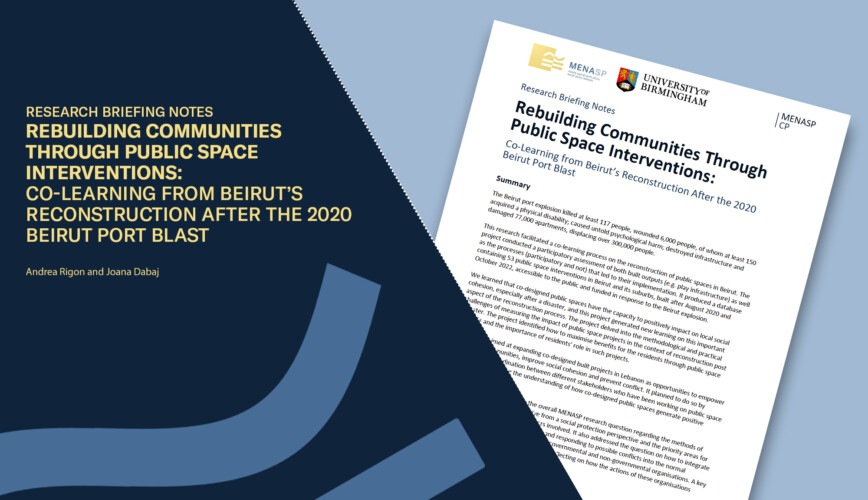The Beirut port explosion killed at least 117 people, wounded 6,000 people, of whom at least 150 acquired a physical disability; caused untold psychological harm; destroyed infrastructure and damaged 77,000 apartments, displacing over 300,000 people.
This research facilitated a co-learning process on the reconstruction of public spaces in Beirut. The project conducted a participatory assessment of both built outputs (e.g. play infrastructure) as well as the processes (participatory and not) that led to their implementation. It produced a database containing 53 public space interventions in Beirut and its suburbs, built after August 2020 and October 2022, accessible to the public and funded in response to the Beirut explosion.
We learned that co-designed public spaces have the capacity to positively impact on local social cohesion, especially after a disaster, and this project generated new learning on this important aspect of the reconstruction process. The project delved into the methodological and practical challenges of measuring the impact of public space projects in the context of reconstruction post disaster. The project identified how to maximise benefits for the residents through public space projects and the importance of residents’ role in such projects.
The project aimed at expanding co-designed built projects in Lebanon as opportunities to empower vulnerable communities, improve social cohesion and prevent conflict. It planned to do so by strengthening coordination between different stakeholders who have been working on public space projects and improving the understanding of how co-designed public spaces generate positive impacts.
The project also contributed to the overall MENASP research question regarding the methods of conflict prevention that are effective from a social protection perspective and the priority areas for capacity-building of the different actors involved. It also addressed the question on how to integrate procedures and policies for anticipating and responding to possible conflicts into the normal functioning of governments, international governmental and non-governmental organisations. A key aspect to which this research contributes is reflecting on how the actions of these organisations could be better coordinated.
DOI: 10.48352/uobxmenasp.0010
Authors:
Andrea Rigon, Professor of Participatory Development Planning (The Bartlett Development Planning Unit at UCL) and Joana Dabaj, Director of Programmes (CatalyticAction)
This project is supported by the Middle East and North Africa Social Policy Network (MENASP) at the University of Birmingham, in the framework of its ‘strengthening social welfare and security in the MENA region’ research programme, funded by the UK Arts and Humanities Research Council’s Global Challenges Research Fund.
Disclaimer: The opinions expressed in this publication are those of the authors. They do not purport to reflect the opinions or views of the Middle East and North Africa Social Policy (MENASP) Network or the University of Birmingham.
